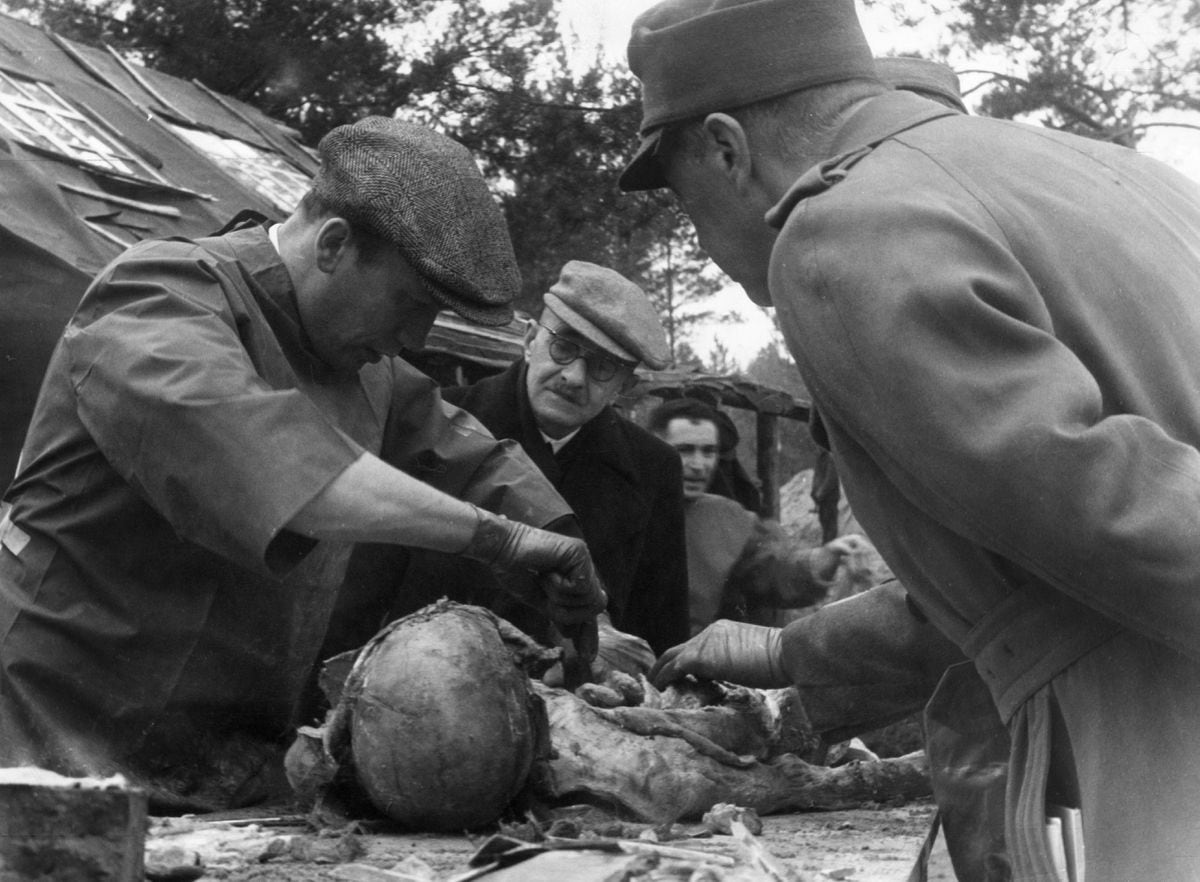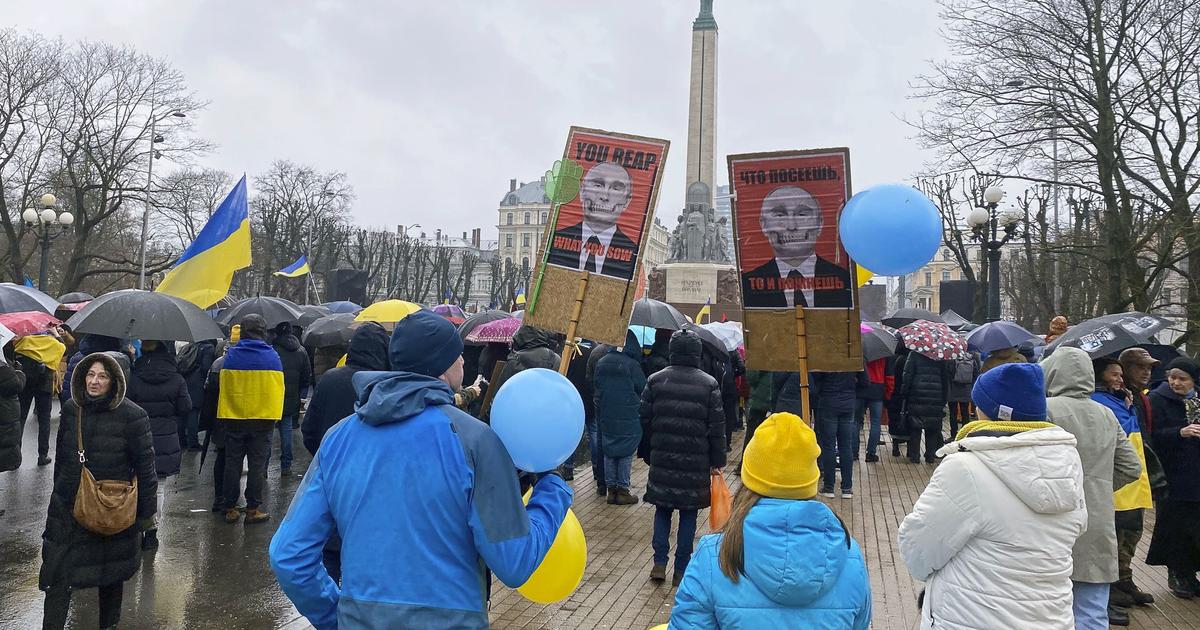Russia's invasion of Ukraine has stoked Poland's old fears of neighboring Moscow.
In full escalation of tension, the Kremlin is now rewriting one of its darkest chapters, the massacre in 1940 of more than 22,000 Poles in the Katyn Forest, in the Russian region of Smolensk, at the hands of USSR forces.
It does so 13 years after the State Duma (Russian Parliament) apologized to Warsaw for that episode perpetrated during the Soviet occupation of the east of the country at the start of World War II.
The Federal Security Service (FSB, heir to the KGB) has now published an alleged act that attributes this war crime to Nazi Germany and exonerates the USSR.
The debate over who was responsible for that bloodbath seemed to have settled with the rapprochement achieved between Warsaw and Moscow more than a decade ago, but times have changed and the hostility between the two countries is maximum.
"The dispute continues in Russia over the unclear circumstances of the
Katyn case
," states an article published by the official magazine of the Russian Foreign Ministry.
"In part, because of the openly hostile position that Poland has adopted towards Russia in recent years and because of the destruction of the monuments to the Red Army soldiers who died during the liberation of that country from the Nazis," the magazine adds, becoming echo of the document made public by the FSB.
The declassified paper contains the statement of a prisoner who served in one of the prisoner battalions
Germans
,
Arnaud Duret.
The record comes from the 1946 Leningrad (present-day Saint Petersburg) trials in which the USSR sentenced the military responsible for mass executions of civilians in occupied territories to death.
According to the testimony of Duret, who escaped capital punishment, the Nazi SS took him along with other inmates to dig trenches "15 to 20 meters deep" in Katyn in September 1941.
The document was released by the Kremlin news agency Ria Novosti.
In an article that cites Russian "experts" and "historians" as a source, whose names it does not reveal, the state media asserts that most of the testimonies of those events continue to be classified and affirms that "the Katyn case was a provocation
of
the secret services of the Third Reich to divide Polish society, through whose territory the Red Army was supposed to reach the border of Germany”.
The release of these statements as evidence to exonerate the USSR from the massacre has been questioned by the independent Russian press.
The Insider
newspaper
remember that Duret retracted other already known statements from that trial after returning to Germany in 1954, and that he denounced having been coerced by the Soviet authorities.
The new revelation also collides head-on with the official investigation undertaken by the USSR since the opening of the late eighties.
Moscow opened a criminal investigation in 1990 that was closed in 2004 – in the first years of Vladimir Putin's presidency – because the military prosecutor's office considered that those responsible for the massacre had already died by then.
In addition, Moscow published in the early nineties the so-called Closed Package Number 1, a compendium of confidential documents in which it was reflected that it was the Soviet Politburo that ordered the execution of the Polish prisoners.
The
Katyn case
was shelved, but the wound was still open.
The Russian Parliament recognized in November 2010 that the execution of thousands of Poles was the work of the USSR.
"The published materials, which for many years were kept in secret archives, show not only the magnitude of this terrible tragedy, but also that the Katyn crime was perpetrated by direct order of Stalin and other Soviet leaders," the parliamentary statement stated with which Moscow apologized to Warsaw.
Image taken in 1943 of the exhumation of corpses from the mass graves of the Katyn forest, in the Russian municipality of Smolensk.EFE
Poland pays tribute every April 13 to the victims of Katyn.
Nazi Germany announced on that day, in 1943, the discovery of massive mass graves where thousands of Polish prisoners shot by the Soviet secret police, the NKVD, during the occupation of the eastern part of the country between 1939 and 1941, had been buried. those murdered belonged to the Polish elite: politicians, administration officials, army officers... The massacre devastated the local resistance and, as a result, the Polish government in exile broke relations with Moscow.
However, after World War II, the USSR kept Poland as a satellite state governed by a single communist party.
Ukraine, Poland and the Kremlin
Poland is today one of kyiv's main supporters in its defense against Russia, and these ties have been tested by waves and waves of misinformation.
One of the Kremlin's false pretenses to justify its invasion is that Warsaw—and sometimes Romania and Hungary—supposedly wanted to take over western Ukraine.
This message has been repeated over and over again from Russia, both through social networks and in public statements by Vladimir Putin himself.
The Russian president said at a meeting of his Human Rights Council on December 7: "In Poland there are latent nationalist elements that contemplate the return of their so-called historical territories, the western areas that Ukraine received by Stalin's decision after World War II. World War".
Just two months after annexing the Donetsk, Luhansk, Kherson and Zaporizhia regions, the president added: "Only Russia can be the sole guarantor of Ukraine's territorial integrity and sovereignty within its current borders."
Russia has also occupied the Crimean peninsula since 2014.
Pole Franciszek Herzog shows a photo of his father, Franciszek Herzog, executed in the Katyn Forest in 1940. Jessica Hill (AP)
Stanislav Kuvaldin, an expert at the Carnegie Analysis Center, sees in Putin's statements "the logic of the Kremlin about artificial nature
of the Ukrainian state.
"If the Ukraine was built by Lenin in 1918, as Moscow now insists, then it can just as easily and legitimately be deconstructed."
The analyst points out, therefore, that Putin's perverse logic is that "only the successor [Russia] of the country that once gave Ukraine its current borders [the USSR] by seizing the lands of its neighbors [Poland] can now ensure its inviolability.
According to Kuvaldin, this leads the Kremlin to think that Ukrainians should be convinced to join Russia for fear of partitioning their country.
The idea has been publicly shared by many other senior Russian officials, such as Foreign Minister Sergei Lavrov and the head of Russia's peace negotiators, Vladimir Medinsky.
Russian foreign intelligence chief Sergei Naryshkin also stated early in the war that Washington and Warsaw planned to "establish strict military and political control over Poland's historical possessions in Ukraine."
For his part, the former president and current vice president of the Russian Security Council, Dmitri Medvedev, said Monday on Telegram that the Poles "dream of reviving the union with Ukraine and restoring the unfinished empire from sea to sea", referring to the borders. of Poland in the 16th and 17th centuries, whose territory stretched from the Baltic almost to the Black Sea, encompassing a large part of Ukraine, Belarus and Lithuania.
In fact, Medvedev even went further, stressing that Poland is an enemy to Russia.
Poland's borders with Ukraine and Belarus are today a huge red line in Eastern Europe.
The accidental fall of a Ukrainian anti-aircraft missile on Polish territory, and therefore on NATO territory, in November of last year set off alarm bells in the Atlantic Alliance.
That incident resulted in two deaths and broke the tense calm in the area, where Aleksandr Lukashenko's regime and the Kremlin tighten the rope with Warsaw.
On the one hand, with the provocation of a migratory crisis through the massive sending of refugees from third countries towards its border;
on the other, with a Russian military deployment that will soon include nuclear weapons.
Follow all the international information on
and
, or in
our weekly newsletter
.
Subscribe to continue reading
Read without limits
Keep reading
I'm already a subscriber



/cloudfront-eu-central-1.images.arcpublishing.com/prisa/THPQ4JJMKFB6FCM67MHYGQGSLE.jpg)

